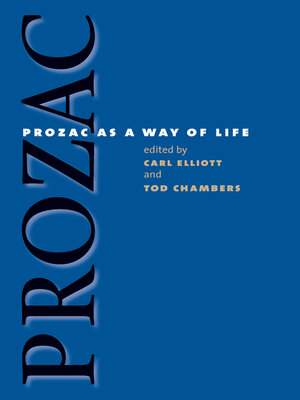
Sign up to save your library
With an OverDrive account, you can save your favorite libraries for at-a-glance information about availability. Find out more about OverDrive accounts.
Find this title in Libby, the library reading app by OverDrive.



Search for a digital library with this title
Title found at these libraries:
| Library Name | Distance |
|---|---|
| Loading... |
Prozac and its chemical cousins, Paxil, Celexa, and Zoloft, are some of the most profitable and most widely used drugs in America. Their use in the treatment of a multitude of disorders — from generalized anxiety disorder and premenstrual syndrome to eating disorders and sexual compulsions — has provoked a whirlwind of public debate. Talk shows ask, Why is Prozac so popular? What, exactly, do these drugs treat? But sustained critical discussion among bioethicists and medical humanists has been surprisingly absent.
The eleven essays in Prozac as a Way of Life provide the groundwork for a much-needed philosophical discussion of the ethical and cultural dimensions of the popularity of SSRI antidepressants. Focusing on the increasing use of medication as a means of self-enhancement, contributors from the fields of psychiatry, psychology, bioethics, and the medical humanities address issues of identity enhancement, the elasticity of psychiatric diagnosis, and the aggressive marketing campaigns of pharmaceutical companies. They do not question the fact that these antidepressants can, in some cases, provide great benefit to alleviate real suffering. What they do question is the abundant popularity of these drugs and that popularity’s relationship to American culture and ideas of selfhood.
Contributors:
Tod Chambers, Northwestern University Feinberg School of Medicine, Chicago
David DeGrazia, George Washington University
James C. Edwards, Furman University
Carl Elliott, University of Minnesota Center for Bioethics
David Healy, University of Wales College of Medicine
Laurence J. Kirmayer, McGill University
Peter D. Kramer, Brown University
Erik Parens, The Hastings Center
Lauren Slater, AfterCare Services, Boston
Susan Squier, Pennsylvania State University
Laurie Zoloth, Northwestern University Center for Genetic Medicine, Chicago
The eleven essays in Prozac as a Way of Life provide the groundwork for a much-needed philosophical discussion of the ethical and cultural dimensions of the popularity of SSRI antidepressants. Focusing on the increasing use of medication as a means of self-enhancement, contributors from the fields of psychiatry, psychology, bioethics, and the medical humanities address issues of identity enhancement, the elasticity of psychiatric diagnosis, and the aggressive marketing campaigns of pharmaceutical companies. They do not question the fact that these antidepressants can, in some cases, provide great benefit to alleviate real suffering. What they do question is the abundant popularity of these drugs and that popularity’s relationship to American culture and ideas of selfhood.
Contributors:
Tod Chambers, Northwestern University Feinberg School of Medicine, Chicago
David DeGrazia, George Washington University
James C. Edwards, Furman University
Carl Elliott, University of Minnesota Center for Bioethics
David Healy, University of Wales College of Medicine
Laurence J. Kirmayer, McGill University
Peter D. Kramer, Brown University
Erik Parens, The Hastings Center
Lauren Slater, AfterCare Services, Boston
Susan Squier, Pennsylvania State University
Laurie Zoloth, Northwestern University Center for Genetic Medicine, Chicago







